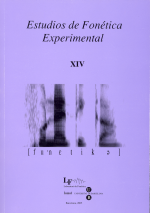Análisis prosódico de un corpus de habla experimental: interrogativas absolutas con expansión en el objeto vs. sin expansión
Abstract
This paper is a new result of the investigation that the research group Profondis (Group of Phonetics) of the Laboratory of Phonetics of the University of La Laguna is doing as part of the Project AMPER-Can (Atlas Multimedia de Prosodia del Espacio Románico in the Canary Islands).
The primary objective of this work is the acoustic analysis of an experimental corpus of absolute interrogatives of the SVO-type with an extension of the object belonging to the two capital Canary Islands, that is, Tenerife (TF) and Gran Canaria (GC) and the validation of the prosodic results by means of a test of perception. On the other hand, we compare these results with those obtained in a previous work in which, with the same methodology, a corpus of SVO interrogatives without extension are analysed. The comparison between the two islands and between the two types of sentences studied proves that the Canarian interrogative model resembles, from a prosodic viewpoint, the Caribbean speech.
References
ALVAR, M. (1975-78): Atlas Lingüístico y Etnográfico de las Islas Canarias (ALEICan), 3 vol (I, 1975; II, 1976 y III, 1978), Las Palmas de Gran Canaria, Excmo. Cabildo Insular de Gran Canaria.
DORTA, J. (1999): «Interrogativas no pronominales en el español atlántico», en Actes del I Congrés de Fonètica Experimental, Tarragona-Barcelona, Universitat Rovira i Virgili-Universitat de Barcelona, pp. 195-201.
DORTA, J. (2000): «Entonación hispánica: interrogativas no pronominales vs. pronominales», Lingüística Española Actual XXII, 1, pp. 51-76.
DORTA, J. y B. HERNÁNDEZ (2005): «Intonation et accentuation dans le cadre d’AMPER. Declaratives vs interrogatives sans expansion à Tenerife et à la Grande Canarie». Projet AMPER, Géolinguistique-Hors Série n.3, Grenoble, Centre de Dialectologie, Université Stendhal Grenoble 3, pp.187-215
GARCÍA RIVERÓN, R. (1996): Aspectos de la entonación hispánica. T II Análisis acústico de muestras del español de Cuba, Cáceres, Servicio de Publicaciones de la Universidad de Extremadura.
GARRIDO ALMIÑANA, J. M. (1991): Modelización de patrones melódicos del español para la síntesis y el reconocimiento de habla, Barcelona, Departamento de Filología Española, Universitat Autònoma de Barcelona.
MASSONE, M. I.; A. SIGNORINI y A. M. BORZONE DE MANRIQUE (1982): «Rasgos prosódicos: organización temporal y ritmo (primera parte)», Fono audiológica, pp. 85-98.
NAVARRO TOMÁS, T. (1948): El español de Puerto Rico (contribución a la geografía lingüística hispanoamericana), Universidad de Puerto Rico.
NAVARRO TOMÁS, T. (1974): Manual de entonación española, Madrid, Guadarrama.
PIERREHUMBERT, J. (1980): The Phonology and Phonetics of English Intonation. Tesis doctoral, MIT.
PRIETO, P. (coord.) (1993): Teorías de la entonación, Barcelona, Ariel Lingüística.
QUILIS, A. (1985): «Entonación dialectal hispánica», Lingüística Española Actual VII, pp, 145-190.
QUILIS, A. (1989): «La entonación de Gran Canaria en el marco de la entonación española», Lingüística Española Actual XI, pp. 55-87.
QUILIS, A. (1993): Tratado de fonología y fonética españolas, Madrid, Gredos.
RIETVELD A. y C. GUSSENHOVEN (1985): «On the relation between pitch excursion size and prominence», Journal of Phonetics, 13, pp. 299-308.
SOSA, J. M. (1999): La entonación del español. Su estructura fónica, variabilidad y dialectología, Madrid, Cátedra.
Downloads
Published
How to Cite
Issue
Section
License

This work is licensed under a Creative Commons Attribution-NonCommercial-NoDerivatives 4.0 International License.
All articles published online by Estudios de Fonética Experimental are licensed under Creative Commons Attribution-NonCommercial-NoDerivs 4.0 International (CC BY-NC-ND 4.0 DEED), unless otherwise noted. Estudios de Fonética Experimental is an open access journal. Estudios de Fonética Experimental is hosted by RCUB (Revistes Científiques de la Universitat de Barcelona), powered by Open Journal Systems (OJS) software. The copyright is not transferred to the journal: authors hold the copyright and publishing rights without restrictions. The author is free to use and distribute pre and post-prints versions of his/her article. However, preprint versions are regarded as a work-in-progress version used as internal communication with the authors, and we prefer to share postprint versions.




